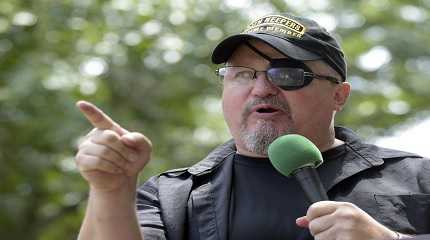
WASHINGTON (AP) — Oath Keepers founder Stewart Rhodes was convicted Tuesday of seditious conspiracy for a violent plot to overturn President Joe Biden’s election, handing the Justice Department a major victory in its massive prosecution of the Jan. 6, 2021, insurrection.
A Washington, D.C., jury found Rhodes guilty of sedition after three days of deliberations in the nearly two-month-long trial that showcased the far-right extremist group’s efforts to keep Republican Donald Trump in the White House at all costs.
Rhodes was acquitted of two other conspiracy charges. A co-defendant — Kelly Meggs, who led the antigovernment group’s Florida chapter — was also convicted of seditious conspiracy, while three other associates were cleared of that charge. Jurors found all five defendants guilty of obstruction of an official proceeding: Congress’ certification of Biden’s electoral victory.
The verdict, while mixed, marks a significant milestone for the Justice Department and is likely to clear the path for prosecutors to move ahead at full steam in upcoming trials of other extremists accused of sedition.
Rhodes and Meggs are the first people in nearly three decades to be found guilty at trial of seditious conspiracy — a rarely used Civil War-era charge that can be difficult to prove. The offense calls for up to 20 years behind bars.
It could embolden investigators, whose work has expanded beyond those who attacked the Capitol to focus on others linked to Trump’s efforts to overturn the 2020 election. U.S. Attorney General Merrick Garland recently named a veteran prosecutor, Jack Smith, to serve as special counsel to oversee key aspects of a probe into efforts to subvert the election as well as a separate investigation into the retention of classified documents at Trump’s Florida estate, Mar-a-Lago.
Garland said after the verdict that the Justice Department “is committed to holding accountable those criminally responsible for the assault on our democracy on January 6, 2021.”
“Democracy depends on the peaceful transfer of power. By attempting to block the certification of the 2020 presidential election results, the defendants flouted and trampled the rule of law,” Steven M. D’Antuono, assistant director in charge of the FBI Washington Field Office, said in an emailed statement. “This case shows that force and violence are no match for our country’s justice system.”
Using dozens of encrypted messages, recordings and surveillance video, prosecutors made the case that Rhodes began shortly after the 2020 election to prepare an armed rebellion to stop the transfer of presidential power.
Over seven weeks of testimony, jurors heard how Rhodes rallied his followers to fight to defend Trump, discussed the prospect of a “bloody” civil war and warned the Oath Keepers may have to “rise up in insurrection” to defeat Biden if Trump didn’t act.
Defense attorneys accused prosecutors of twisting their clients’ words and insisted the Oath Keepers came to Washington only to provide security for figures such as Roger Stone, a longtime Trump ally. The defense focused heavily on seeking to show that Rhodes’ rhetoric was just bluster and that the Oath Keepers had no plan before Jan. 6 to attack the Capitol.
Rhodes intends to appeal, defense attorney James Lee Bright told reporters. Another Rhodes lawyer, Ed Tarpley, described the verdict as a “mixed bag,” adding, “This is not a total victory for the government in any way, shape or form.”
“We feel like we presented a case that showed through evidence and testimony that Mr. Rhodes did not commit the crime of seditious conspiracy,” Tarpley said.
On trial alongside Rhodes, of Granbury, Texas, and Meggs, were Kenneth Harrelson, another Florida Oath Keeper; Thomas Caldwell, a retired Navy intelligence officer from Virginia; and Jessica Watkins, who led an Ohio militia group.
Caldwell was convicted on two counts and acquitted on three others, including seditious conspiracy. His attorney, David Fischer, called the verdict “major victory” for his client and a “major defeat” for the Justice Department. He also said he would appeal the two convictions.
Jury selection for a second group of Oath Keepers facing seditious conspiracy charges is scheduled to begin next week. Several members of the Proud Boys, including the former national chairman Enrique Tarrio, are also scheduled to go to trial on the sedition charge in December.
In an extraordinary move, Rhodes took the stand to tell jurors there was no plan to attack the Capitol and insist that his followers who went inside the building went rogue.
Rhodes testified that he had no idea that his followers were going to join the mob and storm the Capitol and said he was upset after he found out that some did. Rhodes said they were acting “stupid” and outside their mission for the day.
Prosecutors said the Oath Keepers saw an opportunity to advance their plot to stop the transfer of power and sprang into action when the mob started storming the Capitol. The Capitol attack was a “means to an end” for the Oath Keepers, Assistant U.S. Attorney Kathryn Rakoczy told jurors in her closing argument.




